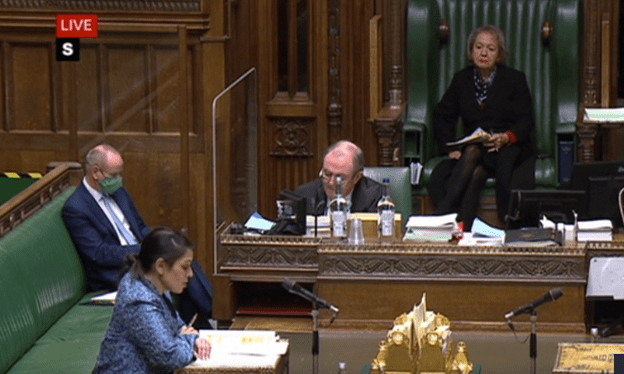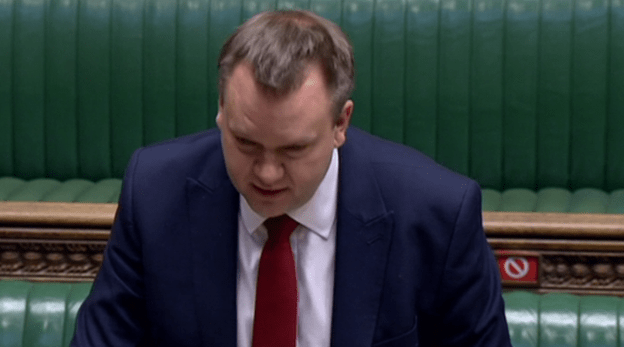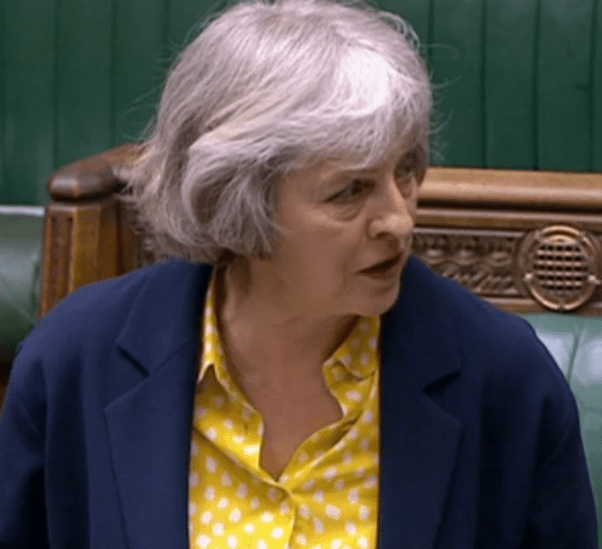MPs called on the home secretary tonight to abandon plans to give police greater powers to curtail the right to protest.

The shadow home secretary, Nick Thomas-Symonds, said arrests at Saturday’s vigil for Sarah Everard “should be a red warning signal”.
Speaking in a debate on the Police, Crime, Sentencing and Courts Bill, he said:
“rushing through ill-judged, ill-thought-out restrictions on the right to protest would be a profound mistake. It would have long-lasting consequences and do great damage to our democracy.”
Labour, the SNP, Liberal Democrats and Plaid Cymru have said they will vote against the second reading of the bill tomorrow because of the protest provisions. More than 150 groups have warned it would be an attack on some of the most fundamental rights of citizens.
The 307-page bill, published last week, includes a new offence of “intentionally or recklessly causing public nuisance”.
It would give police powers to impose start and finish times and set noise limits for static protests, even if they involved just one person. The home secretary would be able to define what was meant by “serious disruption” to a community.
Under the bill, people who refused to follow police directions could be fined up to £2,500. It would be a crime to fail to follow restrictions that protesters “ought” to have known about, even if they had not received a direct order from an officer.
The legislation also includes new laws to criminalise unauthorised encampments and sets a maximum sentence of 10 years for damage to statues and memorials.

Mr Thomas-Symonds told the debate:
“The right to protest to those in power is extremely precious.
“Whether it is our trades unions, whether it is another group that wants to make its views known loudly in our streets, we curtail their ability to do so at our peril.
“The right to protest is one of our proudest democratic traditions. That this government seeks to attack it is to its great shame.
“Our existing laws on protest strike a careful balance between legitimate right to protest and the need to keep order. What our laws on protest do not do and should never do is seek to shield those in power from criticism and public protest.”
He said the government should be ashamed that under the bill someone who damaged a statute could receive a longer prison sentence than someone who attacked a person.
The chair of the Home Affairs Committee, Labour’s Yvette Cooper, said:
“I would urge the home secretary to withdraw those measures and reconsult on them and to try to build consensus so that we can all support the action needed to cut crime.”
The Lib Dem’s justice spokesperson, Wera Hobhouse, said:
“The government says it wants to clamp down on the most disruptive protest. But let us be clear, it aims to silence protest, quite literally.
“It is a thinly-veiled reaction to the climate protest that have taken place for the past couple of years around parliament and in cities and towns across the country.”
She said:
“If the government was really serious about protecting women from violence, it would never attempt to silent their protest. This part of the bill must go.”
“Proactive approach to dangerous protest”

The home secretary, Priti Patel, told MPs the legislation was “a criminal justice bill as much as a policing bill”. She said:
“The right to protest peacefully is a cornerstone of our democracy and one that this government will defend.
“But there is, of course, a balance to be struck between the rights of the protester and the rights of individuals to go about their daily lives.”
She said the Public Order Act was more than 30 years old and recent changes in protest tactics had led to “disproportionate amounts of disruption”.
Last year, she said an emergency ambulance had been blocked, protesters had glued themselves to trains during the rush hour, airport runways had been blocked and people had been prevented from going to work.
The home secretary added:
“On one day last year, many people across the country were prevented from reading their morning newspaper due to the tactic of some groups, a clear attempt to limit a free and fair press, a cornerstone of our democracy and society.”
She said:
“this bill will give the police the powers to take a more proactive approach in tackling dangerous and disruptive protest.”
The threshold on protest noise would be “rightfully high”, she said, and the police response would “still need to be proportionate”.
“Unintended consequences”

The former prime minister, Theresa May, said the measures could have unintended consequences:
“Freedom of speech is an important right in our democracy, however annoying or uncomfortable that might be.
“I do worry about the potential unintended consequences of some of the measures in the bill that have been drawn quite widely.
“Protests have to be under the rule of law but the law has to be proportionate.”
On the provision to allow the home secretary to define “serious disruption”, Mrs May said:
“It is tempting with a home secretary to think that giving powers to the home secretary is very reasonable because we all think we’re reasonable. But actually, future home secretaries may not be so reasonable.”
She said the government should “consider carefully the need to walk a fine line between being popular and being populist. Our freedoms depend on it.”
Another Conservative, Fiona Bruce (Congleton), said the protest measures could outlaw street preachers and people with “non-mainstream views”. It could have a profound effect on free speech, she said.
Anne McLaughlin, the SNP’s justice spokesperson, described the bill’s powers on protests as “draconian” and wide-reaching”. She said people would “effectively be silenced”.
Plaid Cymru’s Westminster leader, Liz Saville Roberts, said the bill was “rushed” and “punitive”. On its effect on Wales, she said:
“It will infringe our right to protest, it will worsen inequality and it will lead to a more unjust society.”
Conservatives Andrea Leadsom, Mark Francois, Tim Laughton and Sarah Dines welcomed the measures to criminalise unauthorised encampments. There was also support from several Conservatives for the proposal to increase to 10 years the maximum prison sentence for damaging statues and memorials.
The debate continues tomorrow.

Thanks Ruth, I’m pleased to see that there are many in government who understand the implications that this bill represents a further draconian suppression of Human Rights in the UK, and are willing to stand up and call for this bill to be drastically revised or completely withdrawn. There are of course the few who support it.
It was revealing that in researching the documents, that the bill provides no protection for women specifically, and does not even mention women in the documents.
When even Priti Patel expressed her displeasure at the actions of the police on Saturday. There is hope yet that sanity and Human Rights will return intact to The UK.
For those who wish to watch the entire debate and make up their own minds, the link is here:-
In full: MPs debate new police and crime Bill in Commons amid protests
If you havent watched the full debate, link above, there is another reading underway, and a decision at 17.00….but dont make too much noise about it…..
This week’s LIVE roundup of climate and XR news | Extinction Rebellion UK
LIVE: USE IT OR LOOSE IT – RIGHT TO PROTEST | Extinction Rebellion UK
This is extremely dangerous to our democracy…..
I find it a lot easier to listen to a debate if there is NOT too much noise going on, apart from the debate!
Goodness, these proposals are full of common sense. Not always common in the Commons, but hope strings eternal.
As Andrea stated:
“Freedom to do what you like-AS LONG as it doesn’t impede the freedom of others to do what they like.”
Dave Timms, Friends of the Earth.
Add your name to defend the right to protest
https://act.friendsoftheearth.uk/petition/add-your-name-defend-right-protest?utm_source=appeal&utm_medium=email&utm_campaign=politics&utm_content=FY2021-03_lm2103018_cta-button-1-ill-sign-the-letter&source=FN2103033&user=75CDEF8505FDE9E4C478FAA752145557
An unintended (perhaps) consequence of XR’s protests – an own goal, if it goes through Parliament. We will see if there are only “the few who support it” PhilC if it gets through Parliament or not, or even is withdrawn? No problem with it for me based on what this article says about it. Does that make me insane I wonder?
Strange!
I watched the debate. The vast majority were supportive of the Bill, and there were no signs of any serious rebellion on the Government benches, so it will be passed. That’s maths. responding to democracy, or vice versa. So, not the few, but the majority will be the deciding factor.
Meanwhile, if I watched on Sky, I could also see a few lonely souls via a split screen, representing XR, trying to block a bridge, and another character being arrested by a monument. Talk about shooting yourself in both feet.
I suspect there will be a few adjustments during the process, but not one’s that change manifesto commitments.
And, yes the Bill does contain provisions that will be of specific benefit to women, but few Bills of this type would specifically refer to women but would apply to all. There are other Bills that specifically deal with concerns of women alone-or together.
So, there will be some who oppose the Bill in Westminster, and be on the record as doing so. The Bill will be passed, and a record of those who passed it, and then May local elections. Timing is key, and a convenient “accident”. LOL. (The focus groups will have been earning their crusts.)
I am left with the image of Nick failing dismally to show he represents women and arguing that with Priti! A male in a suit versus a female in all her finery. Only one winner.
PhilC – doing my own research this morning:
https://www.theguardian.com/environment/2021/mar/16/first-microwave-powered-home-boiler-could-help-cut-emissions
“Electricity usage will be about the same as an electric oven, the makers say.”
I wonder if that is correct – the boiler will be on longer than an oven but perhaps they have taken that into account.
Interesting. Also a lot of residences may not have room for the hot water reservoir tank required.
But an interesting option.
Also a rather worrying article in the Telegraph regarding EV batteries, and how long they last!
Anyone notice how that question has been avoided?
So, how on earth will lease vehicles costs be calculated?
Seems the “answer” provided is it all depends on how quickly you want to charge the vehicle, and the faster you do that then the less life for the battery. As fast charging is what people want, anyone see a problem?
Good old Telegraph. Loads of helpful information.
Martin
Not to worry – invest in mining companies, lots of metals to get out of the earth, and the shorter the battery life the better (and good for the recycling companies). ”Plus will need mountains of rare earth metals too, for the magnets in electric motors and lithium for batteries. A medium-sized electric car currently contains two to three times as much copper as a comparable conventional car. Net zero might be a grubbier business than some like to think.”
So – there would be no protests at any UK mines involved in such mining, and no call for councils to divest their employees (and ex employees) pensions funds of such activities?
Not to worry.
Ocean mining starting to obtain the materials needed.
Forget plastic in the oceans and start with ocean floors trashed.
But, to raise the mood, heard a debate the other day about encouraging UK consumption of fish-and, yes, it happened. A certain Labour MP was concerned that promotion was being given to posh fish-squid-and should concentrate upon working class fish-haddock!! It had to be pointed out gently that the aim was to increase the consumption of UK fish, and UK exported squid ie. more caught than being consumed locally, but haddock had to be imported as we caught less than we ate. That sounds somewhat familiar.
I am not sure metropolitan Labour has yet grasped how those blue wall voters live.
Extinct Rebellion – BE GONE! Swampies
Good old Telegraph. Loads of helpful information. Seriously ?
This has been trailed in the Financial Times for months. Anyone unaware of the geo-political difficulties of mining copper in Africa needs to change newspapers.
But are you actually saying that developing electric car usage and infrastructure is worse for the planet than continuing with the internal combustion engine ? On balance, which does more harm ? Is the whole electric car thing simply an idiotic scam ?
See the EV GRANT has just been cut.
Anyone notice it is fossil fuel subsidy and EV grant?
Yes, Philip, that semantic nonsense is simply an idiotic scam.
No, I was not posting anything of the sort, Philip. I believe it was a Mr. Tate who did that.
But, with a conservative estimate of £5k to replace batteries, and no idea when that would be needed, how does a lease company calculate residual value? And, how about the £28 billion per year in fuel duty? How will that be reallocated? Road tolls? That means a currently over priced product that is subsidised to the hilt, will become a whole lot more expensive.
We have had this discussion before. It is up to those trying to force rapid transition to be able to show how it can work, not just ask questions.
Boris reckons hydrogen fueled cars are internal combustion, so watch that space, perhaps. Much easier and quicker to refuel, good range also, cars and technology already exist. Only thing missing is a network of distribution, but existing fuel stations could easily “transition”, and supply of hydrogen will be vastly increased due to home heating requirement. Could be a lot more practical than a nuclear power station on the outskirts of Okehampton to supply enough electricity to recharge all those holiday makers streaming down to Cornwall in the summer! I am sure they will think kindly upon sitting for hours on end recharging slowly to prevent a £5k+ bill, whilst the kids continue to drain the batteries with their connected gadgets. Imagine that queue with the parents saying, “no Tarquin, you can’t have the video and aircon on otherwise we will never get to our Cornish yurt.”
Oh, and talking about those subsidies, how about the £1.5 billion per year in UK to subsidise wood pellets? Wonder where that comes from? Maybe from current fuel duty? Then, the subsidies for EVs travelling into London that I encountered when a driver delivered a hybrid to me and let me into the company car “scheme” (he used another word) where companies were providing hybrids for staff to commute into London, knowing they would be running on petrol by the time they entered London, but would still be subsidised! That does actually do more harm.
So, I can understand why you would want to just ask more questions, but some time soon, someone will need to provide the answers.
Oh, by the way, Bill just passed onto next stage.